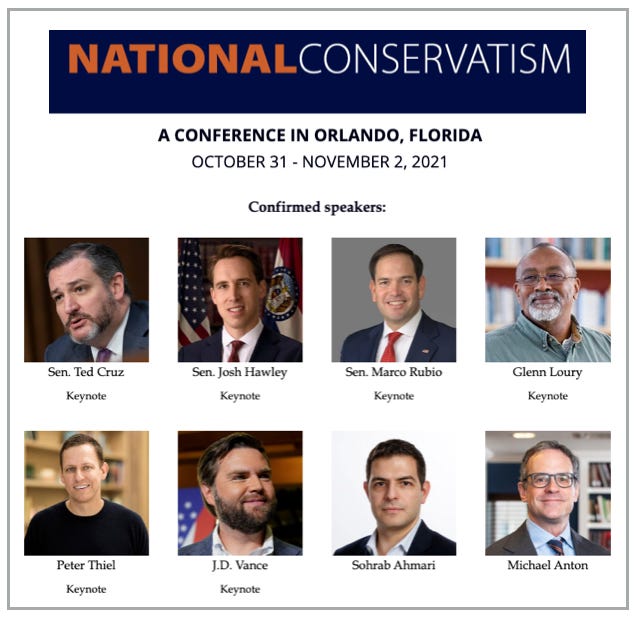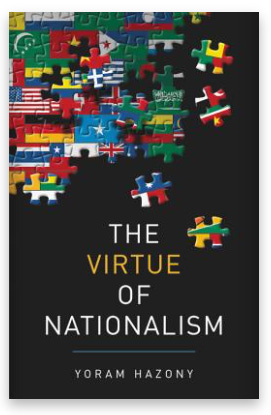Have you ever read someone’s writing and initially found it insightful, hopeful, and essential? But then, as you dug deeper into the text, you gradually became disillusioned… or frightened… or maybe even angry?
That happened to me when I stumbled upon the work of Yoram Hazony. An Israeli-American philosopher, Biblical scholar, and political theorist, Hazony is the chairman of the Edmund Burke Foundation and the godfather of the new National Conservatism movement. The keynote speakers for NatCon’s 2021 conference give you a hint of what Hazony is selling and who is buying:
What has attracted these “leaders” to Hazony’s movement? They share an open hostility to the liberal democratic project.
In his 2018 book The Virtue of Nationalism, Hazony took aim at John Locke, one of the godfathers of liberalism. But you don’t have to read Hazony’s entire book because he distilled his central argument into an article, “Locke’s Rationalism and the Future of Political Theory.” Here’s a key excerpt:
… None of the axioms from which Locke builds his system are empirically true. In saying this, I do not mean only to dispute Locke’s account of the way in which states have historically been founded. Rather, my observation concerns empirical human nature in general: There is no historical context in which Locke’s premises can be said to have been true. Nowhere in history do we find conditions in which human beings are all capable of attaining universal political insight by means of reason alone; are all blessed with perfect freedom and equality; and are all without membership in, and obligation to, any political collectives except those that they have consented to join. And if these things are not empirically true even in a single case, they cannot serve as the foundations for a political theory whose purpose is to understand the political world.
Shorter version: The liberal democratic experiment is built on quicksand.
Hazony’s alternative: National Conservatism.
The nationalism I grew up with is a principled standpoint that regards the world as governed best when nations are able to chart their own independent course, cultivating their own traditions and pursuing their own interests without interference. This is opposed to imperialism, which seeks to bring peace and prosperity to the world by uniting mankind, as much as possible, under a single political regime…. An order of independent nations would permit diverse forms of self-government, religion, and culture in a “world of experiments” that would benefit all mankind.”
Put another way: Each nation has its own history, traditions, and culture. America, in Hazony’s view, is a Christian nation. Its laws, history, culture, values, and vision ultimately emanate from the Christian Bible. Abandon the Bible, Hazony warns, and America is doomed.
Where does that leave American Jews? Where do they fit in a Christian country? They don’t fit. That’s Hazony’s point. Jews don’t belong in America. They belong in Israel. But if they’re stubborn and refuse to emigrate, they could live in a “carve out,” Hazony says, which would guarantee the Jews their rights as American citizens while the nation returned, privately and publicly, to its Biblical (New Testament) roots.
This type of nationalism is one reason Hazony — an observant Jew who was born in Israel and raised in New Jersey — returned to Israel soon after he graduated from Princeton University. He now lives in Jerusalem with his wife and their nine children.
The ghost train
Hazony is right that Locke had a fertile imagination. Some of Locke’s key assumptions do seem disconnected from reality.
Then again, follow Hazony’s train of thought long enough and you rumble right off a cliff. His vision of What’s Next is a nightmare in the making — a dystopian future that marginalizes American Jews, making them strangers in their own country.
Here’s the funny thing…
If I believed my moving to Israel would hasten the coming of the Messiah and the redemption of the world, I’d go. I really would. What would be a better use of my time and my life? And imagine my eulogy: “Father, husband, son, brother, friend, neighbor… and redeemer of the world!” 😂
Seriously, though. Follow Hazony’s ideas to their natural endpoint and see where we land: I move to Israel. So do my wife and children. So do Jews from around the world. In a few years, all the exiles have been ingathered. The prophecies have been fulfilled. G*d is still with us! But… then what?
What’s the next chapter in The Bible According To Yoram Hazony?
Hazony doesn’t have a plausible answer. That’s why he played the Rabbi Tarfon card, above (It’s not up to you to finish the task…). But instead of being humbled by what he doesn’t know and cannot predict, Hazony is emboldened. He believes he’s unlocked the key to how History should play out: All Jews to the Promised Land.
Most troubling of all: Hazony, an observant Jew, is running big annual conferences to sell his ideas to some of the most powerful people in America, many of whom are devout Christians.
This is why I believe it’s not the anti-Semites who pose the biggest threat to Diaspora Jews. It’s the philo-Semites — the people who love the Jews, but only if they play the role that The Creator of The Universe assigned to them: Leave home and go to Zion.
Hazony wants to Make The Bible Great Again. So do I. But his proposed Next Chapter is a disaster in the making.
The question is: Can we write a better one?











Back to this Alan :)
You say: "If moving to Israel would solve the problem, I would move to Israel." Elsewhere you said: "If my moving to Israel would bring the Messiah, then I would." Doesn't this mean that lacking objective proof that the end (or progression?) of the Jewish story in Israel will be better for the Jews than the continuing story in the Diaspora, not only is there no convincing reason to move to Israel, rather, there is all the more reason to remain in the Diaspora and insist on a different narrative, of the Jews' own creation?
Telling myself a story? More like reading the Bible and Jewish history. I think the best Jewish story of the Diaspora is the Iraqi story, that lasted over a thousand years. But it has a bad ending too. Still, I'm willing to hope with you for the triumph of liberal democracy.